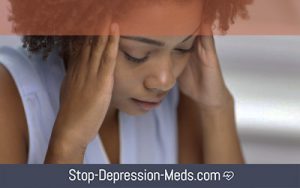How I Fought Depression: from Denial to Treatment
Why depression is a serious disease, not a whim, and how important it is to be able to admit it.
“ALICE, BE SURE TO WRITE ABOUT IT! This is a mystery cleaner than domestic violence: few people dare to talk about it aloud,” – advised me a familiar editor, when I honestly answered why for six months disappeared from the radar and that all this time happened to me. I know, many of my friends will be surprised by my confession, many may decide that I am exaggerating. But the fact remains: for a little less than a year I was suffering from depression with roller coasters of sudden enlightenment and new levels of despair. I write this text in the first person and do not hide the name, because the Russian Internet is full of abstract discussions about the depression of the characters in the third person. “Happens to someone but not me.” This forms a false picture of an anonymous disease, which are subject to if only the weak and losers, faceless crowd without names, names and professions.
I did not realize that I was sick until one November morning I dialed the number of the hotline of psychological assistance for fear that I would do something with myself while my husband and dog sleep in the next room. After several months of sleep and memory disorders, I mentally inspected the house and literally
I was looking for a place to hang myself. The main signs of depression — inattention, irritability, constant fatigue, dissatisfaction with themselves and others — were not perceived separately, and in a few months became part of my personality. To live in such a state was simply impossible, as well as to believe that this state can disappear somewhere.
In any uncomfortable conversation you always need to start over from somewhere far away. In adolescence, I, like many children, tested the limits of their own endurance. My body was athletic and strong and therefore gave incredible results. For example, for two years I lived a double life, preparing for University during the day and reading Gary and Eliade at night. After three days without a dream, I could perfectly pass the exam and speak in public. To quickly make a difficult and unusual task, I had enough to drink a Cup of coffee, and a spoken foreign language by ear, I taught for 4 months.
“Egoism” is one of the most common words in conversations about depression…
Many young people live with a mobile psyche, finally getting used to their condition: I had a typical cyclotomy, as doctors say — a problem faced by 1 to 5 percent of people, while most do not receive any professional help during their lives. Strong periods of active activity were followed by long periods of recession or lazy calm: one most often accounted for Sunny weather, the other — on the cloud. Gradually, the periods became stronger and shorter, after one dramatic event in my life there were outbursts of anger and long periods of unreasonably bad mood, sociability alternated with isolation, and for a person who lives without personal space (first with his parents, and then with her husband), this turned into a huge problem over the years.
The causes of depression or factors of prolonged illness are really most often problems in personal life and at work, illness and death of loved ones, life in an uncomfortable environment or unrealized, alcohol and drug abuse. But there are also a dozen additional factors that, superimposed on the type of personality, can trigger the mechanism of depression without any external triggers. Low self-esteem, long-spoken contradictions with loved ones, hormonal failures, the regime of the day — with predispositions to sharp changes in the mood of any of these factors can become a powerful anchor for depression.
It turned out that in my own case, nothing happened to turn my life into hell. At the time of my severe nervous breakdown last summer, I was married to a loved one, living in the center of my beloved city, surrounded by beloved friends and understanding family. I had a nice freelance job and a lot of acquaintances. I loved everything: reading, watching movies, going to museums, studying, communicating. And at some point I did not sleep for a few days, did not eat and realized that all this from the bottom of my heart I hate. Living the wrong way, pretending to be someone else, taking someone else’s place. And no one’s gonna get hurt if I disappear. A little hallucinations, a little bit of the novel “Nausea” and the film “Interrupted life” — the first time depression pretended to be another existential crisis and a stage that just need to go.
The nervous breakdown lasted only a few days, when I literally walked on the wall, silent or unequivocally answered questions, missed calls and cried several times a day. My birthday was approaching with annual summary questions about what I have achieved, what happened, why I am where I am now, whether I live properly and how it is expected of me. These issues, if you read psychological forums, suffer many adults right before the holiday. All missed opportunities stand in a row, as exhibits in the Museum, to make them easier to see. My answers didn’t comfort me. I know that many people are looking for joy in a fun frenzy, adventures, at the bottom of the bottle or at the end of the jamb, but all these methods have never worked for me. Such a familiar picture of the world where I live in peace with myself, crumbled — and I began to hate myself: for laziness and weakness, for narrow horizons and features of appearance, for every awkwardly inserted word and missed call, for any mistake.
Although my condition worsened after the birthday party and I even had to cancel the party for friends, I was still unaware of my illness, thinking that it was just a bad streak that lasted too long. I was too used to cyclotomy and considered it not a disease, but an integral part of myself. Kurt Cobain was afraid that when he cured his stomach, all the songs would fall out of him and the poems would disappear and he would remain just an ordinary American nerd who was not interesting to anyone. Something similar I thought: if you take away my mood swings, violent summer euphoria and hibernation, gloomy days when you do not want to see anyone, and moments of despair when you want to crumble the reflection in the mirror — it will not be me. Who then will wag his ass at the dance, write poems for any reason and cook at two o’clock in the morning fiery spicy curry? The same girl does the same thing.
At first, I shared a lot of experiences with my husband — a man who understands me better than anyone else and, perhaps, those who himself is experiencing similar conditions. He and all adequate friends confirmed my feelings: to doubt-correctly, to be afraid to make a mistake-normally, to do despite everything — surely, to be open and accepting — the biggest luxury. Everything I shared with them, I heard back. We are afraid, we doubt, we do not understand what we are doing, but we can not do, we have a huge responsibility for parents and children, we must try and force ourselves if you are on the right track.
ACCORDING TO THE WORLD HEALTH ORGANIZATION, depression affects about 350 million people. However, less than half of them receive treatment, and in some countries this figure is not and 10 %. One of the reasons why patients with depression do not receive qualified assistance is the social stigmatization of mental disorders and the lack of available information about the symptoms of depression, as well as about the methods of its treatment.
On forums about depression indeed most women, but are outfitted with and men. Even more surprising to see men on the forums of women’s sites, where they are trying to figure out what to do with their eternally crying wives, how to help them, what they did wrong.
Most say exactly what I felt-list the symptoms of banal, but this is no less acute suffering: it is impossible to get up in the morning from bed, eating through the force, sleep intermittent and restless, constantly feel at ease, uncertainty in every word, light visual and auditory hallucinations, guilt, do not work, shy away from every little thing — whether it is a flying bird or a man on the street.
Many forums complain about years of depression: work through force, life for the sake of the family to the detriment of themselves, unloved classes, life on credit, domestic poverty, lack of friends. They are echoed in the comments by hundreds of sympathizers and share homemade sedative dosages and sites where any pills can be bought without a prescription. Sometimes in the comments people come in with a ready diagnosis or verdicts: “Snickering, you there in the big cities. Flood the furnace in the village — and your depression as a hand will remove“, “I went to the neurologist. She said I should live not for myself, but for my husband and children. Live for others-immediately becomes better. All from egoism.”
Suicidal thoughts are considered by many to be a sin, not a disease…
“Egoism” is probably one of the most common words when talking about depression. How else to call a person who constantly, for several years, says that he is ill? Attracting attention? Shouts “Wolf!”where nothing happens? The indictment was a familiar chorus of “fault” in different ways: “no one forced you to give birth” — for postpartum depression, “she chose now to pick up the pieces” — a bad marriage, “where eyes see” — a problem child, “turn your head and look around, how many laps do poor people” — on any complaint that is not related to a specific disaster.
The arguments regularly include starving children in Africa, slaves in Chinese factories, victims of wars and clean — UPS-and as long as they exist, it means that everything is not so bad for us today. Real and potential suicides are condemned with the zeal of early Christianity: “you do not have enough moral strength to deal with yourself, you do not have to be a rag!”Suicidal thoughts for many are in the space of sin, not disease, and even after the death of the beloved Robin Williams sounded too much poison against a talented person who seems to have everything.
Depression, especially in public people, is often invisible until it’s too late, and confessions of people who suffer from it are almost always signed with fake names or published anonymously. There are not many forbidden words, and “depression” is one of them. We cannot say that we are suffering — as if it would cause others to abandon their happy families and loved ones and begin to suffer. “Depression – from free time. Take yourself for 16 hours-and your legs will fall off, not to depression“. You can sigh as much as you want over a glass of wine with friends, but it is spoken aloud “depression” almost always becomes a stop word in any secular conversation. I said this word several times to almost strangers, they began to clap their eyes and just did not know what to answer me.
For a long time only my husband knew about my condition. I was ashamed and strange to talk about myself in this capacity to anyone — no one saw me crying “just like that” for all 28 years of my life. However, several times in tears for no reason I was caught close friends here have had to say all to be honest. It sucks to admit that you feel worthless and unnecessary, but it was necessary to argue the sudden departures of the guests, the disappearance without saying goodbye, unanswered messages. Then I was late with a couple of work assignments, which never happened to me. Then a few days did not leave the room in the hope of still sleep. It was the fourth month of my insomnia, and I finally realized that one more week like this, and I would have my own fight club. Torture lack of sleep is not in vain considered one of the strongest.
At 8:30 this morning, I wrote to a psychologist friend and asked for urgent contact with a psychiatrist. On the hotline of psychological help on the eve of a cold voice very sober, balanced and emotionless tried to persuade me to make an appointment with two doctors: a neurologist and a psychiatrist. I can’t believe it, but I was afraid to go out and talk to people. I was sweating as soon as I went outside, I was choking in the transport and hid my eyes from passers-by. The road to the pharmacy was a test, my husband could not make me walk the dog for a week, although this is usually my favorite pastime. In the municipal neuropsychiatric dispensary, I was scheduled to visit in 10 days. At that moment I could not think even for tomorrow and from planned visit to the state doctor it was necessary to refuse. I started to look for the doctors themselves, through a friend.
Need to say, that suicidal thought — urgent red-button and signal, that to psychiatrist need turn directly tomorrow, not expecting, that “the very will pass.” Choosing a doctor is a separate trick, and it is worth to tell more about it. Unfortunately, as psychiatry and psychological assistance in Russia is pitiful to see a specialist scared — I think you for all your thoughts put in the hospital and confined to my bed. Therefore, confused patients often seek advice from psychologists and psychoanalysts who do not have medical education, and therefore do not have the qualifications and the right to treat suicidal patients. Their advice and training can be very useful in a normal situation for personal growth, overcoming crisis situations, but not when you want to commit suicide and you are considering a specific way. A psychiatrist is a person with a long-term medical education who, in addition to the medical Institute, can have additional education and experience of internships, can work with medicines, participates in research and experiments.
ACCORDING TO THE INTERNATIONAL CLASSIFICATION OF DISEASES, symptoms of depression are low mood, reduced energy and loss of interest in life. Patients have reduced the ability to enjoy their favorite activities, focus, disturbed sleep and appetite. There are often thoughts of guilt and uselessness. Depressive episodes can range from mild to severe, including hallucinations, suicide attempts, and loss of social activity.
The first psychiatrist took me away from home, and getting to him was a separate torture. A trip to the municipal neuropsychiatric dispensary on the outskirts of the city — a test for himself. How much I can not cope on their own? How deep I fell in your illness? On the benches there were a lot of scared and sad young girls, several pairs of parents who were led by the hand of their children. I calmed down a bit that while I can move myself, without help. The first psychiatrist treated me with hypnotherapy: I decided that I was too strong to resort to medical care, and everything can be done at the expense of my own will and through work with the subconscious. After 6 sessions the dream did not return, and the deterioration has been devastating: over the last week I have lost 5 pounds, drinking almost only water, could not read and memorize any long phrase.
On the birthday of a friend on the eve of the New year, I let go, drank a record amount of alcohol, danced all my legs and flew on vacation. A plane ticket helped me out in the most difficult situations. Rescued and now. Without any pills in the sun among the palm trees, I instantly felt better, started eating normally and slept like a Groundhog. But three days before returning to Moscow, I again felt terribly hard to sleep and breathe. I could not think of anything other than the fact that all the upcoming cases will fail, I will embarrass myself, I will not work and friends with family communicate with me just out of habit. In mid-January, I caught up with another phase of dysphoria.
Hundreds of people had no idea, what’s happening to me…
With noticeable deterioration, I changed the doctor and decided to try treatment again – without pills and hypnotherapy. Attentive, intelligent and very caring, my doctor was not much older than me and had cerebral palsy. The first few minutes I tried to hide the surprise with which I watched him walk. Unlike the first doctor, he asked a lot of personal questions, memorized what I was saying, and struggled to help me cling to all the good that was in me and around me. In the meantime, he told me how he had been learning to walk for two years without any hope that he would go — day after day, he methodically tried to get back on his feet, although the doctors predicted that he would be chained to a chair. Now he swings in the gym and walks alone. I felt ashamed for my two whole legs and for the fits of moping and rage around with this man. “That’s why I’m telling you my story. There was a way out of my situation. From yours it is much easier.”
All psychotherapists warn that the healing process is a painful and long work. At this stage, I literally heard the gears spinning in my head, how hard I am given any unusual thought or atypical action. We did exercises to acquire useful habits, I told him about the long-standing conflict with his own inner voice, that I’m afraid of old age and diseases of loved ones. I had to teach myself to go home not the same way as usual, read unusual books, do unusual things, ten times a day to overcome their own shyness.
The longer I was sick, the more I realized it was time to be honest about what was happening. It was painful for me to confess my illness to my parents. But when I shared my concern, my mom told me about how she had been drinking antidepressants for a long time.
three years old when she burned out at her job. I was 11 or 12, my mom never talked about it. I vaguely remembered seeing my mother lying in one place all day with a wandering gaze full of tears. How she woke up in the middle of the night and came to visit me, how she exploded and cried out of the blue, and I was angry, called names and did not understand what was wrong with her. We really are very similar, but how terrible to hear their own regrets and fears in the mouth of his mother, who 53. How unpleasant to understand that you inherit other people’s fears and problems. It turns out that the tendency to depression is often inherited by us from parents, even if we do not realize it, as well as in life, we often repeat the life scenario of parents, not realizing this report.
All psychotherapists warn that the healing process is a painful and long work. At this stage, I literally heard the gears spinning in my head, how hard I am given any unusual thought or atypical action. We did exercises to acquire useful habits, I told him about the long-standing conflict with his own inner voice, that I’m afraid of old age and diseases of loved ones. I had to teach myself to go home not the same way as usual, read unusual books, do unusual things, ten times a day to overcome their own shyness.
The longer I was sick, the more I realized it was time to be honest about what was happening. It was painful for me to confess my illness to my parents. But when I shared my concern, my mom told me about how she had been drinking antidepressants for a long time.
Three years old when she burned out at her job. I was 11 or 12, my mom never talked about it. I vaguely remembered seeing my mother lying in one place all day with a wandering gaze full of tears. How she woke up in the middle of the night and came to visit me, how she exploded and cried out of the blue, and I was angry, called names and did not understand what was wrong with her. We really are very similar, but how terrible to hear their own regrets and fears in the mouth of his mother, who 53. How unpleasant to understand that you inherit other people’s fears and problems. It turns out that the tendency to depression is often inherited by us from parents, even if we do not realize it, as well as in life, we often repeat the life scenario of parents, not realizing this report.
When I began to talk openly about my illness with others, the usual circle of carefree acquaintances opened from a completely different side. I remember one of the funniest parties at my house ended with my friends discussing loneliness and antidepressants: I found out about a few sweet and active friends that they had been on prescription pills for years. They talked about it so casually and so cool, as about household precautions: two in the morning and one at night, so as not to smear — something in this spirit. I have been seen crying or sombre more often than usual, but I have also seen old friends in others — excited, anxious, afraid to live life half-heartedly. More recently, I came across an article that most of today’s children instead of ghosts afraid of failure — if I was surrounded by all these children in the flesh of old friends. Many excitedly spoke about fatigue from unloved work, about uncertainty in the forces, in the partner, in the future. The crisis was in the juice, and even the most calm began to worry, thinking, what turns their salaries and plans for the year, how to live on and how to change life for the better.
13 % OF MOTHERS SUFFER POSTNATAL DEPRESSION, and half of them were not prone to depression before the birth of the child. In General, different forms of depression are more likely to be diagnosed in women than in men, but gender imbalance may be caused by a greater tendency of women to Express their emotions. In contrast, men are often not ready to admit to the problem and prefer not to seek professional help.
When my insomnia has exceeded for six months, another nervous night I asked my once depressed friend contacts another doctor. For starters, I needed a good sleeping pill just to get a good night’s sleep in six months of my dangerous life. My third psychiatrist met me in a public place when I was once again at the bottom. I’m tired of counting these times and came quietly to a meeting at 9 am, without sleep at night. Hypnotherapy and a five-hour conversation ended with a terrible vision and a very unpleasant discovery: that despite the fact that I seemingly allowed myself to be myself, I can not love myself for real all my life. Make the deficiencies and start working on the advantages to invest all the forces in a favorite and not be afraid of failure. These phobias have most, but if they prevent you to Wake up and get out of bed — in any case, without a specialist here can not do.
After the first visit, I experienced a tremendous surge of strength, which I never felt in my life. I mean, never ever. There are vulgar metaphors about grown wings, but I would rather say that my power is physically and mentally tripled. I was aware of the syndrome of the first visit to the therapist, but I could not even imagine such a relief. The six-month-old lump in my chest disappeared, I started to sleep normally and stopped worrying, for five days I did things that I could not do for two months. But came another critical moment threat of insecurity associated with the job. In my life again there was insomnia and appetite disorders, and for the first time I decided on the pill. They were the simplest and most famous antidepressants under the supervision of a psychiatrist with 30 years of experience who works in the rehabilitation of suicides and packs in one shift pulls people out of the world.
The healing process was painful and long work…
For several days we worked carefully on the daily routine to remove chaos from life. One nepoluchitsya it could confuse me and ruin the mood for a few days. Fear, it turned out, big eyes, and all the difficult and even unbearable things I’ve done in a short time. Clenching my teeth and with tears in my eyes, I suddenly realized how little I knew about things and people around me, how I exaggerated my importance. After I once again got drunk to overcome the awkwardness, the psyche ricocheted in the most terrible way-having lost once again the gift of speech and the desire to live for a couple of days, I swore never to drink, to make it easier to strike up a conversation or feel in place. So I gave up regular alcohol, a known depressant, which I, like many, drank about and without, to remove barriers to communication.
With my doctor, we especially discussed procrastination and laziness. When to be lazy? And when laziness is fear? And what if there is one and the other? In my case, it turned out that being lazy and resting are opposite activities. And the day is much more time than it seems at first glance. To be honest, look at my usual day, it has a lot of space for work and favorite activities, for books and walks, for communication and loneliness, as well as sudden things that I put off all my life. For a hundred years I wanted to sing and dance and learn Spanish, but put it off with excuses that I have a lot of work and I do not have time to spend time with my husband and friends. On the advice of a doctor, I immediately signed up for all the classes that have been postponed for a long time, and the schedule moved, freeing up a lot of sudden time that relieves stress, trains the brains and strengthens the body. Gone stupid shows and procrastination in the network, there was a time in the sport and meeting friends. The postponement is simple and necessary for the business, as it turned out, it was corrosive to my well-being no less than regular cocktails and a sedentary lifestyle.
A few weeks ago I finally recovered, although since the beginning of March I was steadily recovering and easily did what I could not do before. During this cursed year, I wrote quite a lot of texts, conducted lectures and opened two exhibitions, went to interviews, met with friends and even arranged several noisy parties. I met a hundred new people, none of whom probably knew what was going on with me and what it cost me to just say Hello to them and tell them my name. During this time, my husband turned from just my best friend into my bodyguard in the truest sense of the word, and those close friends whom I trusted sat with me in turn, when I was on the edge, and became almost family members.
What was that condition? Why did it happen to me? And will I hit it again? My doctor says you can push off the bottom, and now I’ve been given a lesson forever to distinguish seasonal melancholy from real disease. “Now you will know what is really bad,” — he told me in the end and demanded to constantly monitor the mode of sleep and food and not to postpone for the day after tomorrow what had to be done the day before yesterday. I was really lucky to get out of this pit with people who believed in me. And I also realized how little, false, quiet we talk about this overwhelming sense of despair that haunts us when we live without love for ourselves, our environment, and our cause.
A few years ago, I also thought that depression is “Woe from wit” and that it is enough to believe in the good and be good that this disease, like many others, bypassed you. It was easy for me to imagine that we ourselves, with rare exceptions, are responsible for our diseases. But depression is not treated only good thoughts and a ticket to a warm country, a bottle of wine from Friday to Sunday or casual sex. Like any long and nasty disease, it sits very deep and comes out in all its ugliness when you truly decide to put an end to eternal anxiety once and for all. If it’s time to deal with it, it will not seem enough, I’m sure. And no one can guarantee that depression will not return again at another turn and in another situation. On the other hand, having won it once, you already know exactly what it is in principle you can do. That this is not part of your personality, without which you can not live, and affectionate disease, from which it is necessary to get rid of all the forces and with outside help. And if there’s a person around who says, “I know how you feel, I was depressed, and I think you’re sick, too. Let’s get you to a doctor.”You should listen. Maybe he knows what he’s talking about and reaches out to you when you don’t even know you need it.

 From time to time it is a negative mental discharge: cute fluffy creature demonstrates behavior that is unacceptable in human understanding (“Oh, what a nightmare!”), – scratch, bite and irrigates the urine that is handy, for example untouchable Persian carpet. An unexpected change in the cat’s “personality” can be a symptom of one of many diseases. However, if the veterinarian will rule out all possible physiological causes of the new state, then you can be sure: your pussy is going through a nervous crisis. What is the cause of such deviations from the norm?
From time to time it is a negative mental discharge: cute fluffy creature demonstrates behavior that is unacceptable in human understanding (“Oh, what a nightmare!”), – scratch, bite and irrigates the urine that is handy, for example untouchable Persian carpet. An unexpected change in the cat’s “personality” can be a symptom of one of many diseases. However, if the veterinarian will rule out all possible physiological causes of the new state, then you can be sure: your pussy is going through a nervous crisis. What is the cause of such deviations from the norm? terrible Gorgon turns into a balanced Mrs. Hutson. Let’s say you’ve already begun to understand that your four-legged is depressed. What should be done in this case? You can refer to the tablets and powders. Cats, by the way, the fit of the drugs used in the treatment of nervous system disorders in humans. But that alone is not enough. Modern therapeutic techniques recommend to accompany pharmacological treatment with dense psychological support: to surround the patient with care, to pay special attention to him, to please with tasty, fragrant, useful food, even to feed from hands. So in the case of a nervous breakdown in your pet should not immediately run to a cat shrink – with this trouble can be dealt by yourself at home. Take care of the necessary amount of entertainment; think about games with which the animal will be able to defuse emotional tension and give vent to the manifestation of hunting instinct. Remember: the game is a panacea for many cat troubles. What brings your pet the most joy? In addition to food – it is a game! All items designed for gnawing, braking, skating, shaking and grabbing satisfy not only the cat’s natural need to “hooliganism”, but also distract her attention from your carpets, furniture, shoes. Thanks to the games, the animal maintains physical shape, develops intelligence, does not yearn, does not get bored when he spends long hours alone in the daytime.
terrible Gorgon turns into a balanced Mrs. Hutson. Let’s say you’ve already begun to understand that your four-legged is depressed. What should be done in this case? You can refer to the tablets and powders. Cats, by the way, the fit of the drugs used in the treatment of nervous system disorders in humans. But that alone is not enough. Modern therapeutic techniques recommend to accompany pharmacological treatment with dense psychological support: to surround the patient with care, to pay special attention to him, to please with tasty, fragrant, useful food, even to feed from hands. So in the case of a nervous breakdown in your pet should not immediately run to a cat shrink – with this trouble can be dealt by yourself at home. Take care of the necessary amount of entertainment; think about games with which the animal will be able to defuse emotional tension and give vent to the manifestation of hunting instinct. Remember: the game is a panacea for many cat troubles. What brings your pet the most joy? In addition to food – it is a game! All items designed for gnawing, braking, skating, shaking and grabbing satisfy not only the cat’s natural need to “hooliganism”, but also distract her attention from your carpets, furniture, shoes. Thanks to the games, the animal maintains physical shape, develops intelligence, does not yearn, does not get bored when he spends long hours alone in the daytime. A feature of endogenous depression, occurring in a mild form, is the daily cycle of mood changes, when after waking up in the morning, a person feels the maximum peak of a sad mood, while in the evening the feeling is slightly softened. In severe form of the disease there is a syndrome of” perversion of the daily rhythm”, when in the afternoon there is a noticeable decrease in mood, increased anxiety.
A feature of endogenous depression, occurring in a mild form, is the daily cycle of mood changes, when after waking up in the morning, a person feels the maximum peak of a sad mood, while in the evening the feeling is slightly softened. In severe form of the disease there is a syndrome of” perversion of the daily rhythm”, when in the afternoon there is a noticeable decrease in mood, increased anxiety. This 23-year-old beauty is not just a famous model: she has recently also successfully started her acting career. However, there was a moment in her life when she was ready to give up the future because of depression. Delevingne was diagnosed with depression when she was only 15 years old.
This 23-year-old beauty is not just a famous model: she has recently also successfully started her acting career. However, there was a moment in her life when she was ready to give up the future because of depression. Delevingne was diagnosed with depression when she was only 15 years old. We like to watch her main character in the popular TV series “scandal”, but this actress would like us to know that she suffered from depression, and is not going to hide it. Kerry was in serious trouble during College. She became depressed, which led her to an excessive obsession with food and exercise. Washington found solace in uncontrolled eating. And not to feel guilty, then she’d wear herself out in the gym.
We like to watch her main character in the popular TV series “scandal”, but this actress would like us to know that she suffered from depression, and is not going to hide it. Kerry was in serious trouble during College. She became depressed, which led her to an excessive obsession with food and exercise. Washington found solace in uncontrolled eating. And not to feel guilty, then she’d wear herself out in the gym. John Hamm reached unprecedented heights in Hollywood after playing the role in the television series “Madmen”. He’s another celebrity suffering from depression in his youth, and like many other stars, he wants to clarify one thing: it’s not shameful to talk about.
John Hamm reached unprecedented heights in Hollywood after playing the role in the television series “Madmen”. He’s another celebrity suffering from depression in his youth, and like many other stars, he wants to clarify one thing: it’s not shameful to talk about. Unfortunately, not everyone manages to win the battle against severe depression. A wonderful actor, the late Heath Ledger was one of those people. Although we may never know the whole truth about his death in 2008, it is believed that Ledger suffered from depression for a long time until he accidentally died of an overdose of a few drugs. His depression seems to have been exacerbated by his divorce from his wife and the love of his life, Michelle Williams.
Unfortunately, not everyone manages to win the battle against severe depression. A wonderful actor, the late Heath Ledger was one of those people. Although we may never know the whole truth about his death in 2008, it is believed that Ledger suffered from depression for a long time until he accidentally died of an overdose of a few drugs. His depression seems to have been exacerbated by his divorce from his wife and the love of his life, Michelle Williams. Actress Winona Ryder has grown literally before our eyes. She went from one successful project to another, and everything she did became public. Such have become and its relations with other highly popular actor – Johnny Depp. And after the widely publicized breakup, her depression reached its climax. However, Ryder has suffered from bouts of anxiety and depression since she was 12 years old.
Actress Winona Ryder has grown literally before our eyes. She went from one successful project to another, and everything she did became public. Such have become and its relations with other highly popular actor – Johnny Depp. And after the widely publicized breakup, her depression reached its climax. However, Ryder has suffered from bouts of anxiety and depression since she was 12 years old. Known for her extravagant personality, flashy outfits and incredible voice, Lady Gaga is just a woman of flesh and blood who has been through a lot and wants to help others by sharing her experience. Recently, this successful singer said that as a teenager she went through a rape, and that she is still almost every day suffering from depression and anxiety attacks, with which she just now learned to cope.
Known for her extravagant personality, flashy outfits and incredible voice, Lady Gaga is just a woman of flesh and blood who has been through a lot and wants to help others by sharing her experience. Recently, this successful singer said that as a teenager she went through a rape, and that she is still almost every day suffering from depression and anxiety attacks, with which she just now learned to cope. One of the most beautiful and talented women walking on this earth, Holly berry is another celebrity who has gone through hard times. When her ex-husband, David Justice, told her that he wanted a divorce, she could not cope with the pain. The split of her marriage completely destroyed the self-esteem of the actress, and she briefly plunged into depression.
One of the most beautiful and talented women walking on this earth, Holly berry is another celebrity who has gone through hard times. When her ex-husband, David Justice, told her that he wanted a divorce, she could not cope with the pain. The split of her marriage completely destroyed the self-esteem of the actress, and she briefly plunged into depression. Can you imagine that strong guy, Dwayne Johnson, suffering from depression? However, it is, and there is nothing unusual. Depression can overtake each of us, and a strong appearance can hide a huge internal pain. However, the Rock wants everyone to know that he at some point suffered from this destructive state. When he was about twenty years old, his football career suddenly stopped. Although he was a super-successful College player, the NFL rejected him, and two months later his canadian team said goodbye.
Can you imagine that strong guy, Dwayne Johnson, suffering from depression? However, it is, and there is nothing unusual. Depression can overtake each of us, and a strong appearance can hide a huge internal pain. However, the Rock wants everyone to know that he at some point suffered from this destructive state. When he was about twenty years old, his football career suddenly stopped. Although he was a super-successful College player, the NFL rejected him, and two months later his canadian team said goodbye. Another star whose depression was easily overlooked, as it is a very bright and funny actor. However, in fact, many of the funniest and most positive comedians daily suffer from depression, and use humor to deal with it. Owen Wilson is one of those people: we used to see him in big screen comedies when, in 2007, we suddenly heard the news that Owen Wilson had attempted suicide.
Another star whose depression was easily overlooked, as it is a very bright and funny actor. However, in fact, many of the funniest and most positive comedians daily suffer from depression, and use humor to deal with it. Owen Wilson is one of those people: we used to see him in big screen comedies when, in 2007, we suddenly heard the news that Owen Wilson had attempted suicide. Young singer demi Lovato is at the peak of his career, and in fact she is only 23 years old. However, there was a time in her career when she completely lost control of her life. Since childhood, she was teased for being overweight, which led to serious disorders such as bulimia. She grew up a very troubled child, and only when her family asked for help to specialists, she learned that she had bipolar disorder.
Young singer demi Lovato is at the peak of his career, and in fact she is only 23 years old. However, there was a time in her career when she completely lost control of her life. Since childhood, she was teased for being overweight, which led to serious disorders such as bulimia. She grew up a very troubled child, and only when her family asked for help to specialists, she learned that she had bipolar disorder.